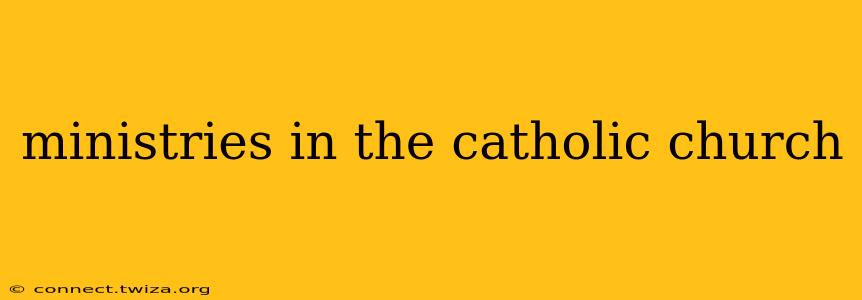The Catholic Church is a vast and complex organization with a rich history and tradition. Understanding its structure and the various ministries within it can be challenging, even for devout Catholics. This guide aims to provide a comprehensive overview of the ministries in the Catholic Church, clarifying their roles and responsibilities. We'll delve into the different levels of ministry, from the ordained priesthood to the lay apostolate, exploring the vital contributions each makes to the life and mission of the Church.
What are the different types of ministries in the Catholic Church?
The Catholic Church recognizes a wide array of ministries, each contributing uniquely to the overall mission. These ministries aren't mutually exclusive; many individuals may participate in several at once. Broadly, they can be categorized as:
-
Ordained Ministries: These are ministries conferred through the Sacrament of Holy Orders, typically involving a lifelong commitment. The most prominent examples are bishops, priests, and deacons. We'll explore these in more detail below.
-
Lay Ministries: These are ministries undertaken by baptized Catholics who are not ordained. They represent a significant portion of the Church's active workforce and play crucial roles in various aspects of parish life and beyond. Examples include lectors, Eucharistic ministers, catechists, and members of parish councils.
-
Consecrated Life: Individuals in consecrated life (e.g., nuns, monks, brothers, sisters) dedicate their lives to God through vows of poverty, chastity, and obedience. They often engage in a wide range of ministries, from teaching and social work to prayer and contemplation.
What are the roles and responsibilities of ordained ministers (bishops, priests, deacons)?
Bishops: Shepherds of the Diocese
Bishops are successors to the Apostles, holding the fullness of Holy Orders. They are responsible for the spiritual well-being of their dioceses (geographical regions). Their roles include:
- Teaching: Interpreting and proclaiming the Gospel message.
- Sanctifying: Celebrating the sacraments, particularly the Eucharist.
- Governing: Leading and organizing the life of the diocese.
Priests: Servants of the Altar
Priests are ordained ministers who assist bishops in their pastoral duties. Their responsibilities primarily involve:
- Celebrating the Sacraments: Offering Mass, hearing confessions, anointing the sick.
- Preaching: Proclaiming the Word of God.
- Pastoral Care: Providing spiritual guidance and support to parishioners.
Deacons: Ministers of Service
Deacons are ordained ministers who serve in a variety of capacities, often assisting priests and bishops. Their roles emphasize service and outreach:
- Proclaiming the Gospel: Reading Scripture and preaching.
- Celebrating Liturgy: Assisting at Mass and other liturgical celebrations.
- Acts of Charity: Engaging in works of mercy and social justice.
What are some examples of lay ministries in the Catholic Church?
Lay ministries are essential to the vitality of the Church. They offer a wide range of opportunities for participation and service:
- Lectors: Proclaim the Word of God during Mass.
- Eucharistic Ministers: Distribute Holy Communion.
- Catechists: Teach the Catholic faith to children and adults.
- Music Ministers: Lead singing and provide musical accompaniment during liturgical celebrations.
- Ushers: Welcome parishioners and assist with the practical aspects of Mass.
- Parish Council Members: Serve on advisory boards that assist the pastor in parish governance.
How do I find out more about ministries in my local Catholic parish?
The best way to learn about available ministries in your local parish is to:
- Visit your parish website: Many parishes have websites listing their ministries and contact information.
- Attend Mass and parish events: This offers opportunities to meet parishioners and learn about their involvement.
- Speak to your pastor or parish staff: They can provide guidance and information about available ministries.
What is the difference between ordained and lay ministries?
The fundamental difference lies in the Sacrament of Holy Orders. Ordained ministers (bishops, priests, and deacons) receive a unique sacramental grace that empowers them to act in persona Christi – in the person of Christ – particularly in the celebration of the sacraments. Lay ministries, while vital and essential, are exercised by the faithful without this unique sacramental grace.
What are the requirements for becoming a lay minister?
Requirements vary depending on the specific ministry and the parish. Generally, active participation in the parish community, completion of relevant training, and a commitment to serving the Church are expected. Contact your local parish for details.
This guide provides a general overview of ministries in the Catholic Church. The specific roles and responsibilities of each ministry may vary depending on the needs of the local church community. The richness and diversity of ministries reflect the vibrant and active nature of the Catholic faith.
